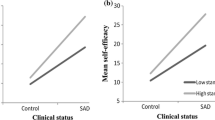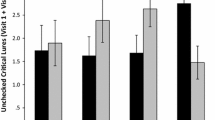Abstract
Current theories predict that following a social–evaluative performance, people high in social anxiety will ruminate about the negative features of the event and, in turn, will show a bias toward recalling the negative aspects of the event. In this study participants presented an impromptu speech and were then provided with half positive and half negative feedback on their performance. A free-recall task was used to test immediate recall for the feedback. Participants returned 1 week later and were again tested on recall for the feedback as well as completing a questionnaire indicating the extent to which they engaged in both positive and negative rumination regarding the speech task during the preceding week. Evidence for a negative memory bias in the high socially anxious group (HI) was found at both times, however this negative bias did not increase over time. The hypothesis that the HI group would spend more time than the low socially anxious group ruminating over perceived negative aspects of the speech task was also supported. Social anxiety and depression scores were both uniquely associated with negative rumination, however when controlling for depression the Group × Rumination–Valence interaction became nonsignificant. The HI group did engage in greater levels of overall rumination however, even when depression scores were statistically controlled. There was no significant relationship shown between negative recall bias and negative rumination.
Similar content being viewed by others
REFERENCES
Abbott, M. J., & Rapee, R. M. (2003). Rumination in response to social threat, physical threat, and depression-related events. Manuscript submitted for publication.
Abbott, M. J., & Rapee, R. M. (in press). Post-event rumination and negative self-appraisal in social phobia before and after treatment. Journal of Abnormal Psychology.
Amir, N., Foa, E. B., & Coles, M. E. (2000). Implicit memory bias for threat-relevant information in individuals with generalized social phobia. Journal of Abnormal Psychology, 109, 713-720.
Antony, M. M., Bieling, P. J., Cox, B. J., Enns, M. W., & Swinson, R. P. (1998). Psychometric properties of the 42-item and 21-item versions of the Depression Anxiety Stress Scales in clinical groups and a community sample. Psychological Assessment, 10, 176-181.
Becker, E. S., Roth, W. T., Andrich, M., & Margraf, J. (1999). Explicit memory in anxiety disorders. Journal of Abnormal Psychology, 108, 153-163.
Breck, B. E., & Smith, S. H. (1983). Selective recall of self-descriptive traits by socially anxious and nonanxious females. Social Behavior and Personality, 11, 71-76.
Claeys, W. (1989). Social anxiety, evaluative threat and incidental recall of trait words. Anxiety Research, 2, 27-43.
Clark, D. M., & Wells, A. (1995). A cognitive model of social phobia. In R. G. Heimberg, M. R. Liebowitz, D. A. Hope, & F. R. Schneier (Eds.), Social phobia: Diagnosis, assessment and treatment(pp. 69-93). New York: Guilford Press.
Cloitre, M., Cancienne, J., Heimberg, R. G., Holt, C. S., & Liebowitz, M. (1995). Case histories and shorter communications. Memory bias does not generalize across anxiety disorders. Behaviour Research and Therapy, 33, 305-307.
Coles, M. E., & Heimberg, R. G. (2002). Memory biases in the anxiety disorders: Current status. Clinical Psychology Review, 22, 587-627.
Heinrichs, N., & Hofmann, S. G. (2001). Information processing in social phobia: A critical review. Clinical Psychology Review, 21, 751-770.
Johnson, K. A., Johnson, J. E., & Petzel, T. P. (1992). Social anxiety, depression, and distorted cognitions in college students. Journal of Social and Clinical Psychology, 11, 181-195.
Klinger, E. (1996). The contents of thoughts: Interference as the downside of adaptive normal mechanisms in thought flow. In I. G. Sarason, G. R. Pierce, & B. R. Sarason (Eds.), Cognitive interference: Theories, methods, and findings(pp. 3-23). Mahwah, NJ: Erlbaum.
Leary, M. R. (1983). A brief version of the Fear of Negative Evaluation Scale. Personality and Social Psychology Bulletin, 9, 371-375.
Lovibond, S. H., & Lovibond, P. F. (1995). Manual for the Depression Anxiety Stress Scales. Sydney: The Psychology Foundation of Australia.
Lundh, L., & Ost, L. (1996). Recognition bias for critical faces in social phobics. Behaviour Research and Therapy, 34, 787-794.
Lundh, L., & Ost, L. (1997). Explicit and implicit memory bias in social phobia. The role of subdiagnostic type. Behaviour Research and Therapy, 35, 305-317.
Mansell, W., & Clark, D. M. (1999). How do I appear to others? Social anxiety and processing of the observable self. Behaviour Research and Therapy, 37, 419-434.
Mattick, R. P., & Clarke, J. C. (1998). Development and validation of measures of social phobia scrutiny fear and social interaction anxiety. Behaviour Research and Therapy, 36, 455-470.
McCarthy, P., & Hatcher, C. (1996). Speaking persuasively: Making the most of your presentation. St. Leonards: Allen & Unwin.
Mellings, T. M. B., & Alden, L. E. (2000). Cognitive processes in social anxiety: The effects of self-focus, rumination and anticipatory processing. Behaviour Research and Therapy, 38, 243-257.
Mogg, K., & Bradley, B. P. (2002). Selective orienting of attention to masked threat faces in social anxiety. Behaviour Research and Therapy, 40, 1403-1414.
Rachman, S., Gruter-Andrew, J., & Shafran, R. (2000). Post-event processing in social anxiety. Behaviour Research and Therapy, 38, 611-617.
Rapee, R. M., Craske, M. G., & Barlow, D. H. (1994). Assessment instrument for panic disorder that includes fear of sensation-producing activities: The Albany Panic and Phobia Questionnaire. Anxiety, 1, 114-122.
Rapee, R. M., & Heimberg, R. G. (1997). A cognitive–behavioral model of anxiety in social phobia. Behaviour Research and Therapy, 35, 741-756.
Rapee, R. M., & Lim, L. (1992). Discrepancy between self-and observer ratings of performance in social phobics. Journal of Abnormal Psychology, 101, 728-731.
Rapee, R. M., McCallum, S. L., Melville, L. F., Ravenscroft, H., & Rodney, J. M. (1994). Memory bias in social phobia. Behaviour Research and Therapy, 32, 89-99.
Stopa, L., & Clark, D. M. (1993). Cognitive processes in social phobia. Behaviour Research and Therapy, 31, 255-267.
Watson, D., & Friend, R. (1969). Measurement of social–evaluative anxiety. Journal of Consulting and Clinical Psychology, 33, 448-457.
Wenzel, A., & Holt, C. S. (2002). Memory bias against threat in social phobia. British Journal of Clinical Psychology, 41, 73-79.
Author information
Authors and Affiliations
Corresponding author
Rights and permissions
About this article
Cite this article
Edwards, S.L., Rapee, R.M. & Franklin, J. Postevent Rumination and Recall Bias for a Social Performance Event in High and Low Socially Anxious Individuals. Cognitive Therapy and Research 27, 603–617 (2003). https://doi.org/10.1023/A:1026395526858
Issue Date:
DOI: https://doi.org/10.1023/A:1026395526858




